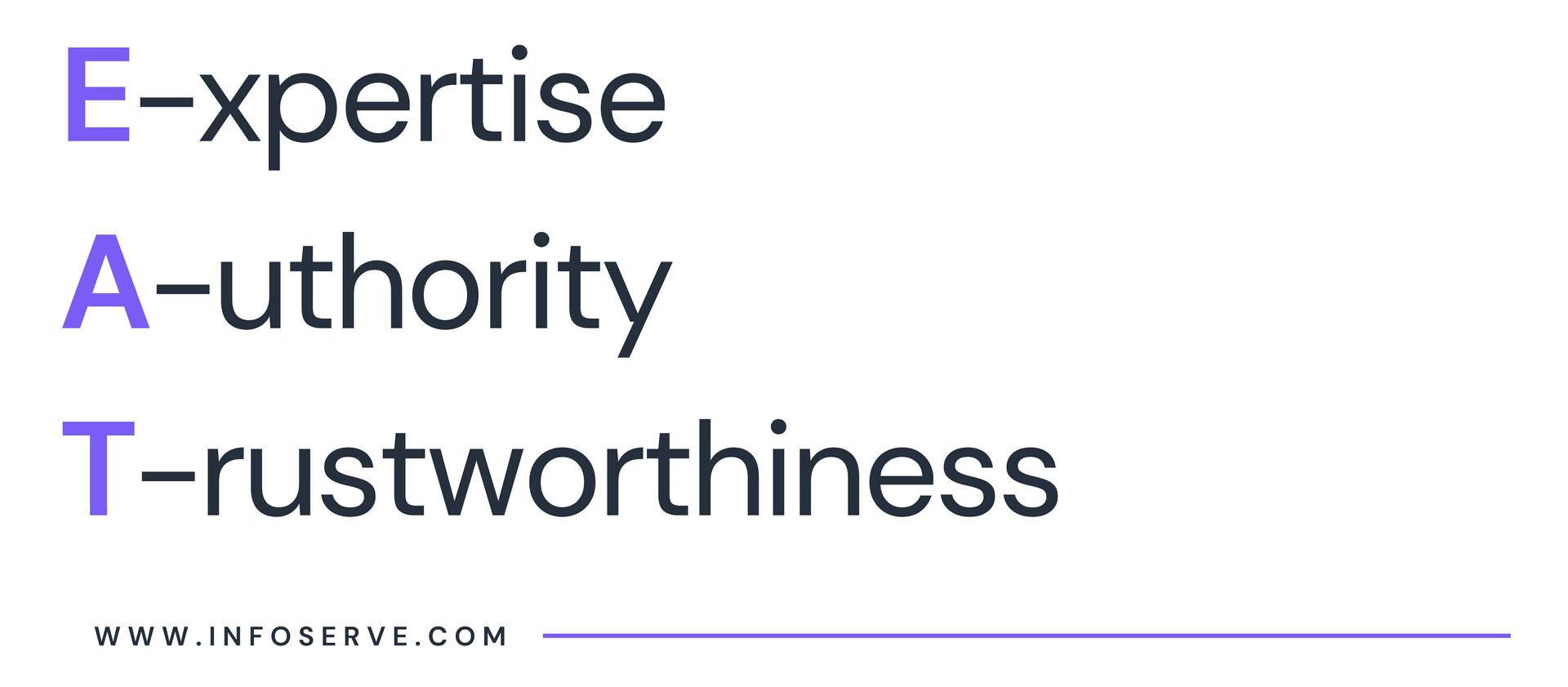What Are the E-A-T Principles & Why Do They Matter?
Every Copywriter and SEO specialist who generates content for websites will be familiar with the E-A-T principles. E-A-T outlines the importance of value and quality above all else when it comes to creating content that resonates with your audience but also ranks highly for relevant industry keywords.
But what exactly is E-A-T and why does it matter?
The
Infoserve team has broken it down for you.
What is E-A-T?
E-A-T stands for expertise, authority, and trustworthiness. It is referenced in Google’s Quality Rater Guidelines, a document used by human quality raters at Google to assess how effectively it is fulfilling its user’s expectations. In this document, E-A-T is used alongside content quality to determine how well each content host is demonstrating these three main principles of user-focussed content.
E-A-T is a key ranking criteria in Google’s algorithm but the specifics surrounding exactly how it’s used and whether it truly matters are a bit wishy-washy.
So let’s take a deeper dive into the fundamentals of Expertise, Authority and Trustworthiness as they pertain to Google’s ranking algorithms:

Expertise
Expertise refers to the level of skill and knowledge demonstrated by the creator of the content.
Google places strong emphasis on expertise as it relates to the subject outlined within the content to ensure its user is receiving the most accurate and reliable information possible.
This expertise is more important in YMYL (your money or your life) subjects like financial, medical and legal because of the significance of their impact on the lives of the readers.
It’s difficult to represent expertise on your website outside of simply using factually correct information, however there are a few things you can do to signal this to Google:
- Have an About Us page that includes accreditations, qualifications and awards won by team members
- Only create content that is highly relevant to your industry. If you’re an SEO specialist and you create content on gym memberships then Google will consider this spammy content
- Having a Wikipedia page and relevant backlinks from similar industry experts can signal expertise
- Work with other experts who can be cited in content, or create guest content for your website
Authority
Authority within SEO is all about your reputation, whether you’re an influencer or an expert in your industry. Authority is also outlined by the principle that you should be seen as the go-to source of information by your customers.
A good example of this within the Digital Marketing sector is HubSpot.
Hubspot is often seen as the leading source of information relating to online marketing because they have established themselves as an authoritative source of information.
Authority can be built up online through multiple positive reviews, references, recommendations by other experts, awards information, online news articles with positive intent and other credible information written about you on the internet.
However, Google has become very good at identifying affiliate sources, so it’s important to put your time into finding high quality external companies who are willing to support you instead of working internally.
Trustworthiness
Trust isn’t just bestowed upon you by your customers; Google is always looking for trust symbols in order to prove that you are a legitimate source of information.
Trust can be demonstrated through transparency, honesty and accuracy of content.
A few recommended strategies for developing trustworthiness include:
- Visible contact information across your website
- Stating who is responsible for published content i.e blogs
- Using factually accurate content
- Citing sources of facts used, for example statistics and quotes

Is E-A-T actually that important?
Although Google is fairly elusive about how they rank E-A-T, as a principle it really does matter with regards to all content across your website, whether it’s a blog, e-commerce site or personal brand.
It is not an official ranking factor, but the principles do directly impact how your content ranks.
This might seem confusing, but let’s break it down:
You may have heard the phrase ‘content is king’ when it comes to SEO and web design. SEO experts are always shouting about adding more high quality content to your website to boost ranking ability, but you may have noticed that you struggle to find many guidelines on what exactly makes content ‘high quality’.
That, in effect, is E-A-T’s purpose.
Expertise, Authority, and Trustworthiness are the guidelines Google uses to determine which content should be ranked higher due to being of superior quality. This relates to several different aspects of its algorithm.
According to these guidelines,
content should:
- Help users
- Be created by an expert
- Be posted on an authoritative site
- Be trustworthy
- Be updated regularly
Google says:
“At Google, we’re always working on ways we can improve your Search experience.
We constantly experiment with ideas to improve the results you see. One of the ways we evaluate those experiments is by getting feedback from third-party Search Quality Raters. Quality Raters are spread out all over the world and are highly trained using our extensive guidelines.
Their feedback helps us understand which changes make Search more useful.”

How to improve E-A-T
Google is ambiguous about how EAT is measured, but there are several things you can do to ensure your website is as E-A-T friendly as it can be.
These include:
1. Featuring high quality internal, external and backlinks
Internal backlinks show that you care about your user’s experience, external links explain to Google that you get your information from reputable sources, and backlinks show that other people online trust your company enough to recommend it.
2. Create detailed About Us Pages on your website
About Us pages give you the space to freely discuss the authority and expertise of your team and your authors in as much detail as you’d like. As discussed above, this includes qualifications, accreditations and awards that all signal a high level of knowledge and experience within the industry in which you operate.
3. Publish and update content regularly
Fresh content is a strong indicator of a trustworthy source to Google. This is because it shows that you care about your audience and the information they have access to, but it also proves that you are still active as a business.
However, a bigger signal of trust is a company that updates and repurposes old content to ensure it remains relevant and includes any new insights into the subject.
4. Seek mentions in community forums
Community forums represent the voices of real people with real opinions on your brand. Whilst backlinks from other websites are an important ranking factor, it is very common for businesses to pay for backlinks or strike a deal with other companies to gain mutual backlinks.
But forums contain honest reviews from customers who are recommending your product to others, making them one of the biggest trust signals on the internet.
5. Have a Wikipedia mention
We know that Wikipedia isn’t always an accurate measure of information but having a mention can significantly improve your authority in Google’s eyes.
In fact, their quality guidelines reference it by name as a source of reputable, unbiased source because Wikipedia requires information about your website/product/business to be verifiable by a third party source.
If Wikipedia thinks you are worthy of referencing due to multiple angles of credibility, then Google will take notice.
And getting a Wikipedia page is really difficult.
6. Ask your customers for reviews
Like community forums, customer reviews provide an honest insight into how customers view your business which is why they are taken into consideration as a trust signal.
For example, if you have 100 reviews and an overall one star rating, Google won’t want to disappoint its customers by offering your business on a platter on page 1 of Google.
However, if you have 100 reviews and an overall 4.7 star rating, then your stellar reputation will be paid attention to.
It is also worth noting that Google compares and contrasts reviews across multiple platforms when deciding on trust factors, so don’t simply rely on Trustpilot. Ask your customers to leave reviews on the following platforms:
- Trustpilot
- Yelp
- OpenTable
Avoid placing reviews from internal sources as these will be seen as fraudulent. Google can compare email addresses to those listed on company’s house and LinkedIn.

Is AI generated content impacting E-A-T?
A debate has been sparked recently regarding the rise of AI generated content and what this means for E-A-T. Within the Content Writing and SEO industry, copywriters are beginning to adapt to new methods of creating written content, and the question has been sparked: is AI content diminishing high quality content?
As you may be aware, AI generated content is derived from other sources of information across Google, and whilst it tries its hardest to find the most relevant, truthful and trusted sources, AI doesn’t always get it right.
The internet is highly saturated with information about all subjects, and when ‘quick-fix’ tools are used, content continues to be recycled rather than provide new insights.
The main element of E-A-T that is up for debate with regards to AI content is expertise.
The benefit of having an expert involved in creating content is that they know more about the inner workings of their industry than a tool such as this ever could, and the insights they provide are far more valuable to their user than other information that is found in several other articles on the same page of Google.
That being said, AI tools can also compare and contrast content across the internet to inform the content in question. The catch is, no matter how accurate AI is, it will always need a human expert to assess the quality of the work it has produced and make edits wherever necessary, as well as double check the facts.
The tools themselves state that any content generated might not be 100% accurate. And Google penalises false content.
So, whatever you use to create your content, however that content comes to be, it is vital to assess it for E-A-T qualities to ensure you are complying with Google’s guidelines and creating the most valuable content to your website’s visitors.
Not sure where to start?
If you’re still struggling to understand E-A-T or simply want a hand implementing it into your content strategy, then
Infoserve can help. Our Content Experts and dedicated
SEO team are experts in creating relevant content that demonstrates your expertise, authority and trustworthiness to Google. Simply give us a call today to discuss your requirements.













